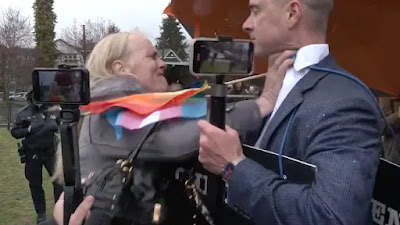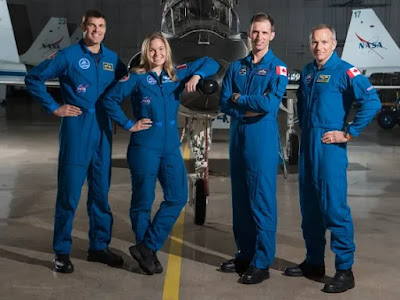Article content
The
announcement will be made jointly by NASA and the Canadian Space Agency
(CSA) at 11 a.m. ET Monday, during an event at the Johnson Space Center
in Houston. There will also be a live event at CSA headquarters just
outside Montreal. The announcement will be broadcast on NASA’s Youtube channel.
The
Artemis 2 mission marks the first journey to the moon by astronauts
since the end of the Apollo 17 mission in December of 1972. From 1968 to
1972, 24 people (all white American men) travelled to the moon, and 12
walked on the surface.
Artemis 2 will be
similar to the flight of Apollo 8, which sent astronauts Frank Borman,
Jim Lovell and Bill Anders on humanity’s first trip around the moon. The
next mission, Artemis 3, plans to land the first woman and the first
person of colour on the moon, likely near Shackleton Crater at the south
pole.
The
flights build on the success of Artemis 1, which sent an uncrewed
capsule on a 25-day, 2.1-million km journey into lunar orbit and back to
Earth, landing in the Pacific Ocean off the coast on Mexico on Dec. 11.
Artemis 2 does not yet have a launch date, but is expected to fly in
late 2024 on what will likely be a mission of about 10 days.
During
U.S. President Joe Biden’s recent visit to Canada, he wrapped up an
address to Parliament with a reference to the Artemis crew that drew
cheers and a standing ovation from Canadian politicians.
“We choose to return to the moon together!” Biden said, echoing President John F. Kennedy’s “we choose to go to the moon” speech of 1962 that galvanized the American space effort.
Article content
“Together
return to the moon,” he added, “and from there we look forward to Mars
and to the limitless possibilities that lie beyond. And here on Earth
our children who watch that flight will learn the names of those new
pioneers. They’ll be the ones who carry us into the future we hope to
build. The Artemis generation. Ladies and gentleman, we’re living in an
age of possibilities.”
The CSA lists 10 retired astronauts including Chris Hadfield, Marc Garneau and Roberta Bondar. The four active astronauts are less well known, and only one has been to space before. Here’s what to know about the others.
Canada’s 4 active astronauts
David Saint-Jacques, 53, flew to the International Space Station in 2018 and spent 204 days there.
Article content
Jeremy
Hansen, 47, was born in London, Ont., and went to high school in nearby
Ingersoll. A colonel in the Canadian Armed Forces, he has a bachelor of
science in space science from Royal Military College of Canada, and a
master of science in physics from the same institute. A CF-18 pilot, he
joined the CSA in 2009 and graduated from Astronaut Candidate Training
in 2011.
Dr. Jennifer Sidey-Gibbons, 34, is
Canada’s only active female astronaut. Born in Calgary, she has an
honours bachelor’s degree in mechanical engineering from McGill
University, and a PhD in engineering from Britain’s Cambridge
University. She joined the CSA in 2017 and completed Astronaut Candidate
Training in 2020.
Jenni Sidey-Gibbons, seen here at CSA headquarters
in Quebec, is one of four active Canadian astronauts and a candidate
for the next Artemis mission. Photo by Canadian Space Agency
Joshua
Kutryk, 41, hails from Fort Saskatchewan, Alta., and has master’s
degrees in space studies, flight test engineering and defence studies. In an interview with the National Post last year, he shied away from the question of what it would be like to be on a flight to the moon.
Article content
“Of
course it’s something that all of us think about,” he said. “But myself
personally, it’s way too early to know where this is all going to go.
But from a national perspective, it’s something that I’m very proud of,
which is Canada’s involvement in the Artemis missions and in the return
to the moon.”
He also pointed out that the crew of
Artemis 2 will beat Apollo’s records for fastest human travel (39,897
km/h on Apollo 10) and farthest from the Earth (400,171 km on Apollo
13).
“It will be the fastest and the furthest
that any human being has ever gone,” he said. “A very, very historical
mission [for] three NASA astronauts and one Canadian. And I think that’s
really remarkable. After that we step into the bigger Artemis Gateway
projects. [Gateway is a planned lunar-orbiting space station.] And we
start to see more and more launches, with the first landing planned for
2025.”
Canada’s agreement with NASA guarantees at least
one more seat on a future flight for a Canadian astronaut. The three
astronauts not chosen for the Artemis 2 mission to orbit the moon might
instead one day set foot on that other world.
https://nationalpost.com/news/canada/canada-will-be-sending-one-of-it-astronauts-to-the-moon-heres-what-to-know-about-them














.svg.png)
